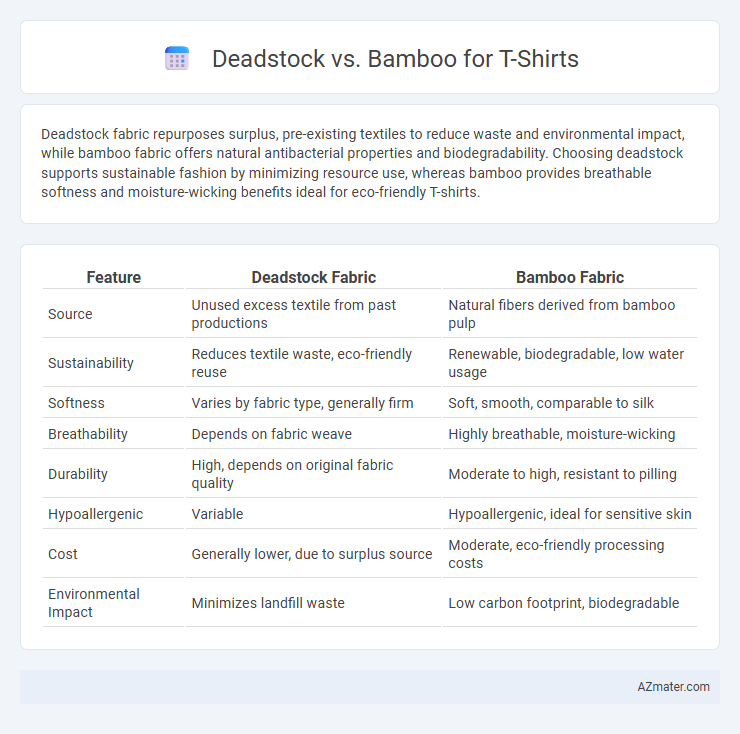Deadstock fabric repurposes surplus, pre-existing textiles to reduce waste and environmental impact, while bamboo fabric offers natural antibacterial properties and biodegradability. Choosing deadstock supports sustainable fashion by minimizing resource use, whereas bamboo provides breathable softness and moisture-wicking benefits ideal for eco-friendly T-shirts.
Table of Comparison
| Feature | Deadstock Fabric | Bamboo Fabric |
|---|---|---|
| Source | Unused excess textile from past productions | Natural fibers derived from bamboo pulp |
| Sustainability | Reduces textile waste, eco-friendly reuse | Renewable, biodegradable, low water usage |
| Softness | Varies by fabric type, generally firm | Soft, smooth, comparable to silk |
| Breathability | Depends on fabric weave | Highly breathable, moisture-wicking |
| Durability | High, depends on original fabric quality | Moderate to high, resistant to pilling |
| Hypoallergenic | Variable | Hypoallergenic, ideal for sensitive skin |
| Cost | Generally lower, due to surplus source | Moderate, eco-friendly processing costs |
| Environmental Impact | Minimizes landfill waste | Low carbon footprint, biodegradable |
Understanding Deadstock and Bamboo Fabrics
Deadstock fabric refers to unused, leftover textiles from previous production runs, offering unique, sustainable material without new resource consumption. Bamboo fabric is derived from the bamboo plant, known for its natural antibacterial properties, breathability, and eco-friendly cultivation requirements. Comparing deadstock and bamboo fabrics highlights sustainability through resource efficiency versus renewable plant-based origins in t-shirt production.
Environmental Impact: Deadstock vs Bamboo
Deadstock fabrics reduce environmental impact by repurposing excess textile waste, minimizing landfill contributions and lowering the demand for new raw materials. Bamboo as a t-shirt material offers sustainability advantages due to its rapid growth, natural pest resistance, and lower water requirements compared to cotton, contributing to soil preservation and reduced chemical use. However, the environmental benefits of bamboo depend on responsible processing practices, as some methods involve chemicals that can negate its ecological advantages.
Sourcing and Availability of Materials
Deadstock fabric is sourced from surplus or unused textile inventory, offering a sustainable option with limited and inconsistent availability due to its reliance on leftover materials. Bamboo fabric, derived from bamboo pulp, is more consistently available as it is produced from renewable bamboo plantations and processed in bulk by textile manufacturers. Sourcing deadstock requires close relationships with suppliers and quick acquisition to secure rare fabrics, whereas bamboo sourcing benefits from established supply chains focused on sustainable and scalable production.
Durability and Longevity Comparison
Deadstock fabric offers exceptional durability due to its high-quality, pre-manufactured materials that have been preserved without wear. Bamboo fabric provides natural strength with antimicrobial properties and excellent moisture-wicking capabilities, contributing to its long-lasting comfort. When comparing longevity, deadstock T-shirts tend to retain their shape and color longer, while bamboo T-shirts excel in softness and breathability but may show signs of wear sooner.
Comfort and Wearability Factors
Deadstock fabric offers unique softness due to its vintage cotton fibers, providing superior breathability and a broken-in feel ideal for T-shirts. Bamboo fabric excels in moisture-wicking and antimicrobial properties, enhancing comfort by keeping the skin dry and odor-free during wear. Both materials contribute to wearability, but bamboo's stretch and durability often outperform deadstock in long-term comfort and ease of movement.
Eco-Friendliness: Which Is More Sustainable?
Deadstock fabric repurposes unused textile inventory, significantly reducing waste and minimizing the environmental impact of new production processes. Bamboo fiber, derived from a fast-growing plant, offers renewable and biodegradable qualities but often involves chemically intensive processes that can affect sustainability. Comparing both, deadstock fabric presents a more environmentally friendly option by directly reusing existing materials, whereas bamboo's sustainability depends heavily on the manufacturing practices employed.
Production Processes and Resource Use
Deadstock t-shirts utilize leftover fabrics from previous fashion productions, significantly reducing waste by repurposing unused materials and minimizing the need for new textile manufacturing. Bamboo t-shirts are made from bamboo fibers, which require less water, pesticides, and land compared to conventional cotton, making the production process more sustainable and environmentally friendly. Both methods aim to reduce environmental impact, with deadstock focusing on waste reduction and bamboo emphasizing resource-efficient cultivation.
Cost Considerations for T-Shirt Brands
Deadstock fabrics offer t-shirt brands a cost-effective option by repurposing unused textiles at lower prices compared to newly manufactured materials. Bamboo fibers, while typically more expensive due to sustainable farming and processing methods, provide long-term value through durability and premium eco-friendly appeal. Brands must balance initial material costs with consumer demand for sustainability and quality when choosing between deadstock and bamboo t-shirts.
Style and Aesthetic Possibilities
Deadstock cotton T-shirts offer unique vintage textures and limited-edition prints, creating distinctive retro aesthetics that appeal to sustainable fashion enthusiasts. Bamboo fabric provides a smooth, luxurious drape with natural sheen, lending itself to modern, minimalist styles with enhanced breathability and moisture-wicking properties. Combining deadstock's nostalgic charm with bamboo's sleek finish allows designers to explore a broad spectrum of styles, from rustic casual to refined contemporary.
Choosing the Best Fabric for Your Values
Deadstock fabrics offer a sustainable choice by repurposing unused textile inventory, reducing environmental waste and promoting circular fashion practices. Bamboo fabric provides eco-friendly benefits through its rapid renewability, natural antibacterial properties, and softness, making it ideal for comfortable, breathable T-shirts. Selecting between deadstock and bamboo depends on your priorities in sustainability, texture preference, and the environmental impact of fabric production.

Infographic: Deadstock vs Bamboo for T-Shirt
 azmater.com
azmater.com